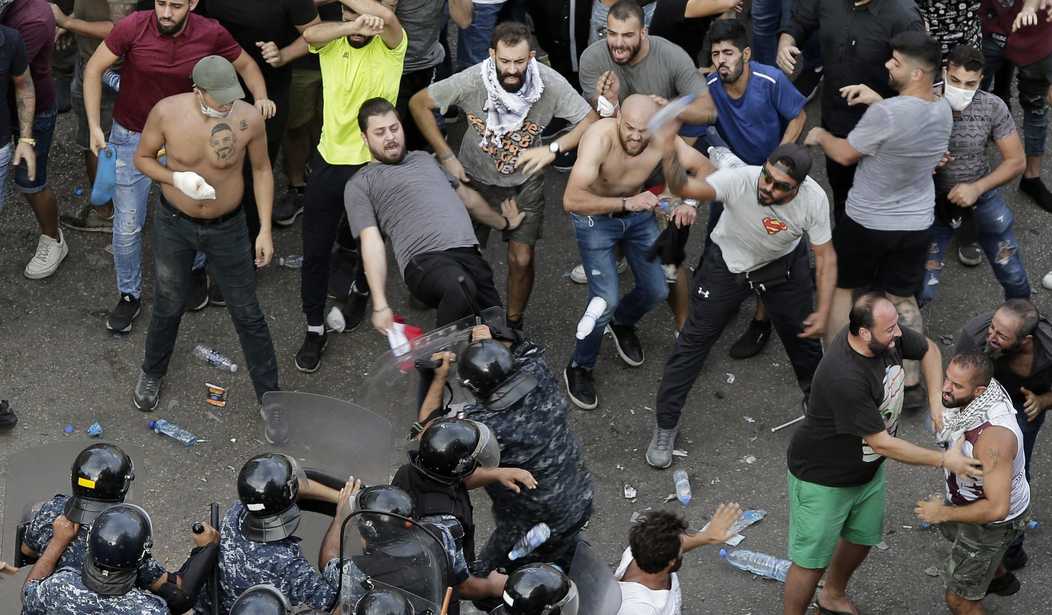In Lebanon and Iraq, governments dominated by Iran-friendly Shiite Muslims have been forced to resign while in Syria and Yemen, Iranian power is ebbing.
Anyone who can read a map knows that Iran’s grand strategic vision for Shia hegemony is faltering. And the mullahs who dreamed it up are panicking.
Iran’s projects in Iraq, Lebanon, Syria and Yemen are coming under siege to such an extent that its leaders are in a state of panic. In Syria, the Iranian project has been set back by a Russian-approved US-Turkish deal, effectively blocking the strategic causeway Tehran was planning to complete its crescent of power, stretching all the way from Tehran to the Mediterranean via Iraq, Syria and Lebanon. In Iraq, there is a Shiite backlash against Iran’s excessive meddling in Iraq, to the point that protesters are chanting: “Iran get out”, despite a violent backlash from the IRGC-backed Popular Mobilisation Forces, who have fired live ammunition at protesters in Karbala, the consecrated heartland of Shiite religious doctrine.
In Lebanon, fear of Hezbollah has collapsed along with the unity government of accord it forms part of and Hezbollah chief Hassan Nasrallah is reduced to pointing the finger of blame. In Yemen, Iran’s expansionist project is facing a setback as the Saudi-Emirati exit strategy from the war is bearing fruit, giving Houthis a new path of belonging to a federalised Yemen, instead of looking towards Iran and its attempts at warmongering, with funds dwindling under US sanctions.
Iranian leaders, reeling from sanctions and growing unrest among the young and unemployed masses, have sought to goad Trump into attacking them. It has apparently failed.
General Kenneth McKenzie Jr, head of US Central Command (Centcom), last week addressed a conference held by the National Council for US-Arab relations. He said Iran remains a priority, but less so than China and Russia, in US strategic planning. He warned against false interpretations regarding the deployment and withdrawal of US troops in the Middle East and the Gulf, saying Iran continues to be monitored. And he spoke of deterrence “without provocation” as an important challenge to US calculations regarding Iran.
That means short of attacking the U.S. or its troops directly, Trump won’t rise to the bait.
More to the point, the unrest across the region is generational, leaving the future very much in doubt for Tehran.
The young generation in Lebanon as well as in Iraq stand for victory against fear and blind obedience. They have risen up against corruption in their countries and against a political class that foolishly thought their power was permission to be greedy and venal. But this generation is also rising up against the 40-year-old presumption of the Iranian regime that it can dominate Arab youth through sectarianism, intimidation, oppression and Iranian-backed militias.
We see it in both Lebanon and Iraq where Shia youth are not buying what Iran is selling. They are in the streets, which must terrify Hezbollah and their masters in Tehran. The Shia militias in Iraq are already gunning down fellow Shia protesters. If the revolution in Lebanon goes too far, would Hezbollah do the same?
Without a doubt, yes. As it turns out, even Shia young people can’t be bought off with appeals to their religion. They want jobs. They want a life like they see other young people in the west living. Their leaders are hamstrung from making these kinds of basic reforms because of their allegiance to the fanatical, doctrinal holy men in Tehran.
The end game won’t be pretty. Iran will feel compelled to insist on a massive, bloody crackdown before democratic reforms dilute their power completely. We saw it work in Iran when religious police and the Revolutionary Guards murdered hundreds of protesters following the 2009 presidential election. Intimidation and the arrests of the protest leaders silenced the movement for change.
History may very well repeat itself in Iraq and Lebanon.










Join the conversation as a VIP Member